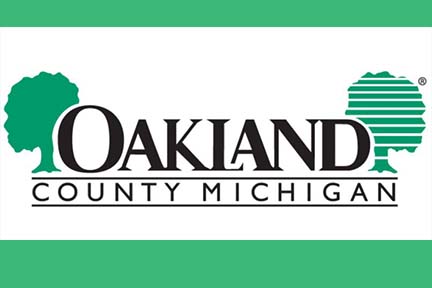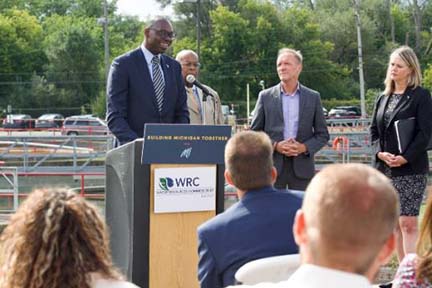
by orionontv | Sep 14, 2022 | Regional News
MEDIA ADVISORY: Oakland County Explores Our Region’s Future Readiness for Electrification and Connectivity at Detroit Auto Show
Oakland County Executive Dave Coulter will moderate a panel discussion on “Future Readiness for Electrification & Connectivity” on Auto Industry Tech Day at the North American International Auto Show at Huntington Place in Detroit.
Who
Dave Coulter, Oakland County Executive; Erin Quetell, Oakland County Environmental Sustainability Officer; Ahmad Jawad, Signal Systems Engineer at the Road Commission for Oakland County; Andrew Clemence, Senior Vice President of Green Technology at DENSO International America
What
Oakland County Executive Dave Coulter will moderate a panel discussion on “Future Readiness for Electrification & Connectivity” on Auto Industry Tech Day at the North American International Auto Show at Huntington Place in Detroit. Joining the county executive on the Automobili-D stage will be Erin Quetell, environmental sustainability officer for Oakland County; Ahmad Jawad, intelligence transportation systems manager and signal systems engineer for the Road Commission for Oakland County; and Andrew Clemence, senior vice president of green technology and the electrification business unit at DENSO.
When
Sep 15, 2022, 9:00 AM

by orionontv | Sep 14, 2022 | Regional News
| FOR IMMEDIATE RELEASE:
September 14, 2022 |
|
AG Nessel Saves Money for Consumers Energy’s Natural Gas Customers
|
|
LANSING – In her continuing advocacy to ensure that energy remains affordable for residents across the state and that utility customers are only charged their fair share for service, Michigan Attorney General Dana Nessel entered into a settlement with Consumers Energy Company in its gas utility plant depreciation case which was approved by the Michigan Public Service Commission (MPSC) last week.
Consumers Energy filed a request to change its depreciation rates for its gas utility assets with the MPSC in December 2021. Its request in Case No. U-21176 included an annual decrease in depreciation expense of approximately $900,000 based on a study performed by the company.
The Department of Attorney General sought additional information from Consumers and based on the analysis of her expert, determined that Consumers’ proposal did not reduce depreciation rates enough and that if approved, would result in ratepayers continuing to pay excessive depreciation expense. Michigan Public Service Commission staff also participated in the settlement agreement, which results in a reduction in annual depreciation expense of $29.26 million, and saves gas customers $28 million more than the less than $1 million reduction proposed by the utility. The new depreciation rates will be incorporated into rates in Consumers Energy’s next gas rate case although a part of the change in depreciation rates related to renewable gas accounts will take effect immediately.
“My department is vigilant in ensuring the maximum savings for utility customers,” said Nessel. “Michigan households deserve all the savings we can help pass on to ensure their costs do not increase.”
So far this year, the Attorney General has saved Michigan consumers about $2 billion by intervening in utility cases before the MPSC. This settlement reaffirms her commitment to affordable energy for consumers.
Consumers Energy provides electricity to approximately 1.9 million throughout Michigan and natural gas to 1.8 million customers across the state.
|
|

by orionontv | Sep 14, 2022 | Regional News
Oakland County Continues Big Investments into School Mental Health and Learning Delay Resources and Basic Needs for Students
- Oakland County has committed more than $47 million to assist the county’s 175,000 students with mental health, learning delay, and basic needs.
- The county is leveraging $5 million in American Rescue Plan (ARP) funds for learning delay grants to be administered by United Way of Southeastern Michigan. Applications should be available by the end of September.
- For the second year in a row, the county is utilizing $10 million-plus in ARP dollars to provide mental health professionals in schools.
Pontiac, Michigan – Oakland County continues to invest tens of millions of dollars in resources for school mental health, learning delay, food and housing assistance, and wraparound services for students and their families in 2022. Oakland County Executive Dave Coulter and Board of Commissioners Chairman David T. Woodward, joined by educators, students, and community leaders, highlighted how American Rescue Plan funds are bolstering the start of the new school year during a news conference today at the Pontiac School District Administration Building.
“As our kids go back to school, I knew it was a priority to boost the funding that we’re giving to districts to help with the mental health challenges students are facing, as well as provide resources to address learning delay issues brought on by remote learning,” Coulter said. “With the COVID relief funding we got from the federal government in the last 2 years, we’ve been able to make critical and transformational investments.”
The county is employing $5 million in ARP funds for learning delay grants to be administered by United Way for Southeastern Michigan. Applications should be available by the end of September.
“We share a passion with Executive Coulter, commissioners, and the county to do everything possible to make sure families are more stable and that every child has opportunities to succeed in school and beyond,” said Tonya Adair, chief people, equity, and engagement officer, United Way for Southeastern Michigan. “These funds are so important to make sure students have support in and out of the classroom, to prepare them for life. We are glad to support this effort towards addressing learning loss for students impacted by the pandemic.”
The county is also utilizing more than $10 million ARP dollars to provide mental health professionals in schools for the second year in a row.
“The students of today have faced challenges most of us have never experienced,” Pontiac School District Superintendent Kelley Williams said. “Districts across our region have seen the toll these past few years have taken on our children, and the positive impact an investment in mental health resources has on their success. We are grateful to the county for their commitment to this initiative.”
Finally, the county is investing more than $18 million in housing and food assistance for students and their families this year.
“Oakland County is proud to lead Michigan and lean in to make sure every student has the resources, support, and tools to succeed,” said Oakland County Board of Commissioners Chairman David T. Woodward. “Every dollar we invest in our students is a smart investment to create unprecedented opportunity for all – now, and long into the future.”
Below is a complete list of $47 million in investments Oakland County has made to aid students and their families with mental health resources, learning loss, and basic needs.
Investments
Mental Health
- $10 million in June 2021 for mental health professionals in schools.
- $10,150,000 in June 2022 for mental health professionals in schools.
- $500,000 for the Communities in Schools wrap-around program, student support coordinators. This was a Ballmer Foundation initiative. Ballmer $500,000, Oakland $500,000, school match $500,000. This is targeting Pontiac, Oak Park, Ferndale, and Madison School in Madison Heights.
- $1,001,615 in June 2021 to support the cost of mental health services with co-pays, deductibles for under insured and uninsured students.
- $448,385 in June 2021 for mental health navigators working with schools to increase services and support for students.
Learning Delay
- $5 million in the summer of 2022 for learning delay grants to be administered by United Way of Southeastern Michigan. Applications should be available by the end of September.
Basic Needs
- $50,000: June 2021, Youth Assistance for casework assistance.
- $450,000: June 2022, Oakland Family Services to help childcare workers get the training they need to get certified.
- $1.2 million in June 2021, for childcare scholarships of up to $1,200 each.
- $2 million: June 2022, Oakland County’s continuum of Care, home repairs.
- $250,000: June 2022, Fair Food Network to expand double up food bucks
- $2 million: June 2022, Food landscape study.
- $1.7 million: June 2022, Lighthouse and Pontiac Community Foundation for grants for emergency food providers.
- $5 million: April 2022, Housing Trust Fund, increasing available affordable housing and rental units.
- $2 million: June 2021, Legal Aid to help fight foreclosure or eviction.
- $5 million: April 2022, Shelter Capacity Fund: to increase the number of available shelter beds, including more for families to provide privacy.
- $312,000: June 2022: to Water Resources Commissioner to increase enrollment in water assistance programs.
Total: $47,062,000

by orionontv | Sep 14, 2022 | Regional News

Gov. Whitmer Announces Michiganders to Receive Additional Assistance in September to Lower Cost of Groceries
LANSING, Mich. – Today, Governor Gretchen Whitmer announced all Michigan families who are eligible for food assistance benefits will continue to receive at least an additional $95 monthly payment in September to help lower the cost of groceries and ensure Michiganders can keep more of their hard-earned money. The additional assistance will help more than 1.3 million Michiganders in more than 700,000 households.
“We will keep working together to help over 1.3 million Michiganders put food on the table,” said Governor Whitmer. “This extra $95 monthly payment will lower grocery bills and help households use more of their hard-earned dollars for bills, school supplies, and other essential expenses. I will work with anyone to put money back in people’s pockets so they can get a little breathing room. This assistance ensures that federal tax dollars get sent back to Michigan and are spent at Michigan businesses.”
In April 2020, some Michigan residents began receiving additional food assistance under this program. In May 2021, all eligible households began getting extra monthly benefits. Federal approval is necessary every month.
Eligible clients who receive food assistance received the additional benefits on their Bridge Card by Sept. 26. These benefits are loaded onto Bridge Cards as a separate payment from the assistance provided earlier in the month.
All households eligible for the Supplemental Nutrition Assistance Program (SNAP) receive an increase of at least $95 monthly, even if they are already receiving the maximum payment or are close to that amount. Households that received more than $95 to bring them to the maximum payment for their group size will continue to receive that larger amount.
Below are the maximum allowable benefits for SNAP customers based on their respective household size:
- One Person: $250
- Two Persons: $459
- Three Persons: $658
- Four Persons: $835
- Five Persons: $992
- Six Persons: $1,190
- Seven Persons: $1,316
- Eight Persons: $1,504
Secured by U.S. Senator Debbie Stabenow as Chairwoman of the U.S. Senate Agriculture Committee, the federal government is providing additional funding to states for food assistance under House Resolution 6201, the Families First Coronavirus Response Act.
Eligible families do not need to re-apply to receive the additional benefits. People who receive food assistance can check their benefits balance on their Michigan Bridge Card by going online to www.michigan.gov/MIBridges or calling a consumer service representative toll-free at 888-678-8914. They can ask questions about the additional benefits by calling or emailing their caseworker.
Customer service is available 24 hours a day, seven days a week. Spanish and Arabic service is available. If you are deaf, deafblind, or hard of hearing or speech-impaired, call the Michigan Relay Center at 7-1-1.
|

by orionontv | Sep 14, 2022 | Regional News

Photos: Lt. Governor Garlin Gilchrist Highlights $32 million Investment to Build New Oakland County Water System, Saving Residents Money
Clinton River Water Resources Recovery Facility becomes second facility in the country to use innovative technology to remove contaminants and protect drinking water
PONTIAC, Mich. – Lt. Governor Garlin Gilchrist today toured the Clinton River Water Resources Recovery facility in Pontiac to highlight state of Michigan investments in water infrastructure in Oakland County and throughout Michigan. A $32 million investment under the state of Michigan’s Clean Water State Revolving Fund helped Oakland County upgrade the facility and protect drinking water.
“This facility, and the investment that helped Oakland County implement innovative technology, is an example of the progress we can make when we come together and focus on getting things done,” said Lt. Governor Garlin Gilchrist II. “The Governor Gretchen Whitmer and I have made transformational investments in Michigan’s water infrastructure through our Building Michigan Together and MI Clean Water plans and we are committed to working with anyone to grow our economy, create jobs, and invest in water infrastructure in communities across Michigan.”
The Clinton River Water Resource Recovery Facility treats approximately 30 million gallons of stormwater and sanitary sewage each day, serving communities in Oakland County. The Clean Water State Revolving Fund loan helped Oakland County upgrade the facility’s biosolids management and replace aging equipment, and made the facility the second facility in the nation to use a new process called Thermal Hydrolysis Pretreatment (THP). THP recycles methane gas created by wastewater to power the treatment process.
“Equipping our communities with effective, innovative climate-resilient water infrastructure solutions will be imperative in coming decades,” said Liesl Clark, Director of EGLE. “This project is an example to the rest of the state and nation of what is possible when cooperation, leadership and vision is applied to that task.”
“The Clinton River Water Resource Recovery Biosolids’ Project benefits Oakland County residents by contributing to a better environment for all,” said Water Resources Commissioner Jim Nash. “The project was financed through the State of Michigan Revolving Fund Loan program, and we are thankful for the support. It was an honor to host the Lt. Governor at our facility today.”
Investing in water infrastructure
Since taking office, Governor Whitmer has invested more resources into water infrastructure than the previous eight years combined. These investments support good-paying jobs and ensure every parent can give their kid a glass of drinking water and know it’s safe.
The Building Michigan Together Plan includes nearly $2 billion to address critical water infrastructure needs, creating 27,000 jobs. More than $1 billion for drinking water improvements, including $325 million to replace lead service lines, $55 million to reduce toxic contaminants like PFAS, and funds to rebuild wastewater and sewer infrastructure, protect groundwater resources, provide clean water for schools and childcare centers, prevent highway flooding, and more.
The Building Michigan Together Plan builds on over $2 billion in investments made in water infrastructure since the governor took office, which have supported an additional 30,000 jobs – 57,000 jobs in total.
The bipartisan FY2023 budget the governor signed ensures even more water infrastructure upgrades by helping communities leverage state and federal funding to remove lead service lines more quickly, modernize water infrastructure, and test and protect clean water.
The governor also signed bipartisan legislation to update Michigan’s State Revolving Fund statute, making it easier for communities to finance and initiate water infrastructure projects and allowing dollars to flow more efficiently to address modern infrastructure needs of communities throughout Michigan.
|
by orionontv | Sep 6, 2022 | Local News

FOR IMMEDIATE RELEASE CONTACT: Jana Bullock, 760-261-9166
Hadley Homestead Harvest Day – FARM HOP & FESTIVAL with new Farm Hop Stops
First 150 Farm Hop tickets purchased receive two complimentary BBQ meals at the Pork & Plaid Kick off.
Hadley, MI –The FARM HOP is returning for a second year on September17th! This event is
designed for families, history buffs and those who simply want to revisit old America. Equipped
with a map, guests on this self-guided tour will enjoy an engaging perspective of local properties
integral to the agricultural heritage of the Hadley area. Highlights include a scavenger hunt and
demonstrations. Come and get an up-close look at the farms, barns and historical sites that hold
stories of this community’s past.
Begin your self-driven FARM HOP tour between 10:00 am to 2:00 pm from the Hadley Mill
Museum or Le Fleur Décor Festival in Hadley MI. The FARM HOP STOPS (venues) close at
4:00p.
.
The FESTIVAL at Le Fleur Décor at 3442 Hadley Road, Hadley MI includes Antiques, Plants,
Art Fair, Music, Food and more and goes from 10:00 to 5:00pm. Admission is free. Look there
for the Historical Society booth.
The HADLEY MILL MUSEUM at 3633 Hadley Road, Hadley MI will be open from 10:00 to
5:00. Admission is free.
New this year is the PORK & PLAID Kick-off event on Friday night, 9/16 from 5-8pm This is a
free community event with live music, activities and of course…wear plaid and bring blankets or
lawn chairs. The first 150 Farm Hop ticket purchased receive two complimentary BBQ meals at
the kick- off. The museum will be open for tours.
FARM HOP TICKETS for the self-guided tour are $20.00/car regardless of the number of
passengers. The number of tickets is limited so purchasing in advance is advised.
Tickets may also be purchased the day of the event at the HADLEY MILL MUSEUM and the
FESTIVAL from 10:00 am to 2:00 pm. Members of the Hadley Township Historical Society
may purchase tickets for $10/car.
ADVANCE TICKET SALES will be available after Aug 1 at:
1. HadleyHistorical.Eventbrite.com – small fee charged
2. Hadley Township Historical Society Events – see HadleyHistorical.Eventbrite.com
3. The Pork & Plaid Kick-off event in Hadley on Friday September 16
4. Local businesses including: The Parlour, Le Fleur Décor, Metamora Market, Cottage
Used Books and Hadley Township Offices.
Net proceeds go Hadley Township Historical Society community projects. No refunds. Rain or
Shine.












